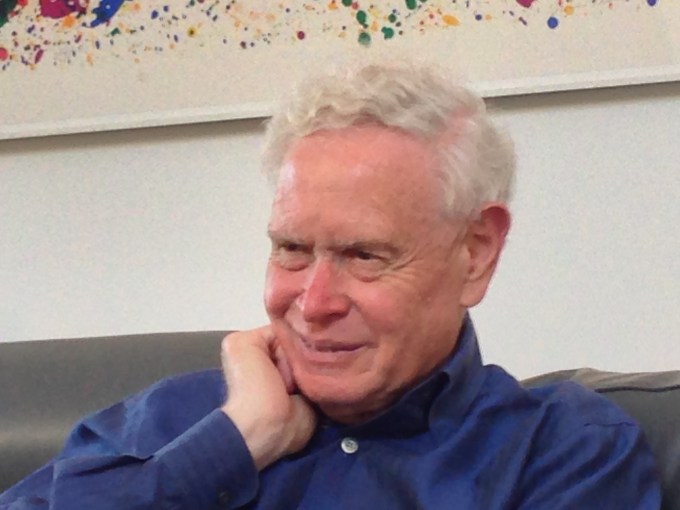Paul Brest didn’t set out to transform philanthropy. A constitutional law scholar who clerked for Supreme Court Justice John Harlan and is credited with coining the term “originalism,” Brest spent twelve years as dean of Stanford Law School.
But when he was named president of the William & Flora Hewlett Foundation, one of the country’s largest non-profit funders, Brest applied the rigor of a legal scholar not just to his own institution’s practices but to those of the philanthropy field at large. He hired experts to study the practice of philanthropy and helped to launch Stanford’s Center for Philanthropy and Civil Society, where he still teaches.
Now, Brest has turned his attention to advising Silicon Valley’s next generation of donors.
From Stanford to the Hewlett Foundation
Scott Bade: Your background is in constitutional law. How did you make the shift from being dean at Stanford to running the Hewlett Foundation as president?
Paul Brest: I came into the Hewlett Foundation largely by accident. I really didn’t know anything about philanthropy, but I had been teaching courses on problem-solving and decision making. I think I got the job because a number of people on the board knew me, both from Stanford Law School, but also from playing chamber music with Walter and Esther Hewlett.
Bade: When was this?
Brest: I started there in 2000. Bill Hewlett died the year after I came. Walter Hewlett, Bill’s son, was chair of the board during the entire time I was president. But it’s not a family foundation.
Bade: What were your initial impressions of the foundation and the broader philanthropic space?
Brest: Not having come from the non-profit sector, it took me a year or so to really understand what it [meant] to use our assets in each area in a strategic way. The [Hewlett] Foundation had very good values in terms of the areas it was supporting — the environment, education, population, women’s reproductive rights. It had good philanthropic practices, but it was not very strategically focused. It turned out that not very many foundations were strategic.
Paul’s framework for thinking about philanthropy

Photo provided by Paul Brest
Bade: What do you mean by ‘strategic’?
Brest: What I mean [by] strategic is having clear goals and having an evidence-based, evidence-informed strategy for achieving them. Big foundations tend to be conglomerates with different programs trying to achieve different goals.
[Being strategic means] monitoring progress as you work towards those goals. Then evaluating in advance whether the strategy is going to be plausible and then whether you’re actually achieving the outcomes you’re trying to achieve so that you can make course corrections if you’re not achieving.
[For example,] the likelihood that the roughly billionaire dollars or more that have been spent or committed to climate advocacy are going to have any effect is quite low. The place where metrics comes in is just having kind of an expected return mindset where yes, the chances of success are low, but we know that the importance of success — or putting it differently, the effects of failure — are going to be catastrophic.
What a strategic mindset does here is say: it’s worth taking huge bets even where the margins of error of the likelihood of success are very hard to measure when the results are huge.
I don’t want to say the [Hewlett] Foundation was anti-strategic, or totally unstrategic, but it really had not developed a [this kind of] systematic framework for doing those things.
Bade: You’re known in the philanthropic community for putting an emphasis on defining, achieving, measuring impact. Have those sort of technocratic practices made philanthropy better?
Brest: I think you have to start by asking, what would it mean for philanthropy to be good? From my point of view, philanthropy is good when I like the goals it chooses. Then, given a good goal, when it is effective in achieving that goal. Strategy really has nothing to say about what the goals are, but only how effective it is.
My guess is that 90 plus percent of philanthropy is intended to achieve goals that most of us think are good goals. There are occasions when you have direct conflicts of goals as you do with say the anti-abortion and the choice movements, or gun control and the NRA. Those are important arguments.
But most philanthropy is trying to improve education or improve the lives of the poor. My view is that philanthropy is good when it is effective in achieving those goals, and trying to do no harm in the process.
Current debates on philanthropy
Bade: A lot of philanthropy has traditionally been focused locally. Is there a special responsibility for tech donors to focus on local issues in the Bay Area given their outsize impact here? Or do they have broader obligations as global firms?
Brest: There’s a fundamental argument on this issue. There’s a paper written a couple of years ago by Alexa Cowell and a colleague [Heather McCleod Grant] called The Giving Code which essentially argues that Silicon Valley philanthropists are not giving as much as they should to local causes.
Partly because it’s their community, partly because the wealth in the Valley may be creating more problems for poor people in the Valley. That’s one side.
The other side would be the effective altruism argument. There’s the Open Philanthropy Project created by Dustin Moskovitz and Cari Tuna, who say that money should go where it is going to do the most good for the people in greatest need.
The Giving Code argument essentially is directed implicitly or explicitly to the Silicon Valley Community Foundation, which doesn’t do all that much grantmaking itself but has large donor-advised funds, and is concerned about the way the donor funds are spent.
Anyway, that is the debate. I think it gets complicated by, does the money that ends up in the hands of individuals like Mark Zuckerberg and others, does it come from the Valley? Or has it come from around the world? This is in a sense, the effective altruism argument. What are the moral obligations of anybody with huge wealth to the world at large where it’s needed, rather than their geographic community? How important is the geographic community?
Why does the geographic community have claims that are different from the global community? Both of those, they use the word community as a metaphor in all of these cases.
Bade: And where do you come out in this debate?
Brest: I guess, to the extent that the mechanisms by which the wealth was created have actually exacerbated problems for the poor, then I think there’s an obligation to try to remediate the problems that they have caused. I think even if you’re an effective altruist, that there are moral obligations to not cause harm, or to remedy harms you’ve caused that may either take precedence over, or at least compete with the more general utilitarian effective altruist argument.
I think the area where it seems that the growth of tech has maybe had the most impact on the poor is property prices. So, Santa Clara County is responsible for the highest homelessness rate of any part of the Bay Area.
My guess is that that has to do with property prices and zoning decisions, which are in part responsive to rich people in Silicon Valley. So I think there’s probably a good argument for local philanthropy from that point of view.
Bade: Is it fair to say that you should be thinking about both at the same time?
Brest: I think so, yeah.
Bade: Of course I have to ask you about Anand Giridharadas, and his critique that elite philanthropy ignores the structural issues, that big banks can support green initiatives, and tech companies can support women and minorities learning to code without fixing the underlying problems that their sector has caused.
In other words, that their philanthropy, and the philanthropy of the billionaires and other wealthy people that come out of those industries, is really a fig leaf to do good without changing the fundamental business model or power structures. Do you think that’s the case?
Brest: Well, first of all, [Giridharadas] doesn’t really make any arguments. He makes ad-hominem polemical statements. There’s very little in the way of argument there.
But my own view is, we absolutely need structural change in many respects, and the way to bring about structural change is through politics, not through philanthropy. If you look at important structural changes, none of these are changing the basic nature of a capitalist economy, whether or not they should.
Things like getting the Affordable Care Act passed, whatever the next stage of medical care for all, or medical care for all who need it. Trying to reduce the huge wealth inequalities that have been exacerbated by the last tax reform act. This is stuff that’s done mainly in Congress and state legislatures. Philanthropy has a very limited role to play there.
Bade: On an issue like education, there’s an argument that billionaires like Gates, Zuckeberg, and the Waltons are really defining the policy debate through the ed reform movement, in a way that is sometimes unhelpful.
Brest: That’s a different issue from Anand’s argument that they’re not dealing with structural issues. Indeed, you could think of the charter school movement, which I have a fair amount of skepticism about, as an attempt by philanthropy to deal with the structural issue.
That is, thinking that it’s healthy for traditional public schools to have competition from charter schools. That’s actually a pretty systemic approach, even if on the whole I think it has not been successful.
Bade: Do you think it’s a good idea for philanthropists whom no one has voted for to have that power, to be pushing those agendas?
Brest: I guess my question is, what’s the alternative? Philanthropists have to decide what causes they want to support and what goals they want to have. They have to decide what strategies they want to support.
Sometimes a strategy comes from the grantee organizations, sometimes it comes from government, sometimes it’s generated by philanthropies themselves. It’s usually a mixture of those.
[That’s] really [Stanford professor] Rob Reich’s argument, which is that philanthropists are exercising too much power. Rob argues that the main role of philanthropy should be to fund pilot projects. Then if they succeed, they can be taken up by government.
What happens when if they succeed, government is not interested in taking them up? I think a good example of this is we’re trying to increase opportunities for disadvantaged youth, where there have been a number of pilot projects showing that things work. In the absence of government being willing to take them up, there’s been an aggregation of philanthropic funds, like the Blue Meridian Partners [a philanthropic partnership] to scale it up.
Maybe that’s different from trying to bribe a school district into changing the way it does things, as [Bill] Gates did with the small high school initiative. But I think the question always is: what’s the alternative in the real world?
Bade: Isn’t the alternative higher taxes?
Brest: That’s not an alternative, it’s yes and. But, I mean, if philanthropies were using their advocacy strategies to advocate against higher taxes, I think that that would be a good argument. On the whole, philanthropies have much less effect on taxes than voters do.
And the IRS limits the extent to which a foundation can engage in politics. I’m not defending philanthropy, I’m saying that in any case, you have to look at what the alternative would be. Warren Buffet is an example of somebody who’s been amazingly generous with his philanthropy, and thinks that rich people should be taxed more. These are not inconsistent goals.
But would you rather — and would Rob Reich, who is the main critic in this respect — would he rather have a situation in which the oil companies and other fossil fuel companies can advocate without any opposition on the other side? Or a world in which you have philanthropies like [the] Hewlett [Foundation] advocating on the other side of it?
Rob argues for kind of an ideal world. I think about the real world. So, what would happen if philanthropy were forbidden to advocate for policies that would reduce global warming? You would have Exxon Mobil being able to advocate, but nobody on the other side. And Exxon Mobil is not elected either; they have shareholders, but that’s a very different thing for being elected to change policy.
Bade: What about the Koch brothers and others like them, where they’re advocating for policies that are more aligned with their bottom line? You could say that the Hewlett Foundation has no real dog in the fight on climate — the Hewlett family is not going to make money off of climate. Whereas there might be a material interest with other foundations?
Brest: I think it would be interesting to think about whether one could have some tax policies that look behind the corporate veil or the private foundation veil, and saw whether philanthropy was acting in the economic interest of the owners. I think that the Koch philanthropy certainly has done that. Although, Koch philanthropy has also advocated for criminal justice reform, and other reforms which are not, so far as I can tell, in their own interest.
Tech philanthropy today
Bade: Let’s circle back to tech. You’ve advised many in the tech world on how to think about setting up their philanthropies. Is there a way that people in the industry are doing philanthropy now that it’s different from other philanthropy?
Brest: I think we’ve seen the growth of LLC’s as a substitute for foundations. I think that reflects the interest in some of the new philanthropists, or some of the new people with wealth who want to effect social change. In kind of two different kinds of activities besides the funding of 501-C3s [the legal structure of a typical non-profit] which is traditional philanthropy.
One which we’ve talked about is advocacy, because there is no significant restraint on advocacy if you’re not trying to get a tax reduction. So, an LLC which is simply really an organized form of the individual’s checkbook, and can be used for political advocacy. You just don’t try to get a tax reduction for that.
It breaks the traditional boundary between the advocacy that a foundation can do, and the advocacy that anybody involved in politics can do. I think that’s a realization that some important systems change is most effectively done through bare-knuckle politics, rather than what foundations are allowed to do.
The LLC also reflects an increased interest of using investing as a tool for social change, so-called ‘impact investing.’ I’m somewhat skeptical about this, not about impact investing as such, [but] when you’re trying to get risk-adjusted market returns and have impact at the same time. It’s not impossible to do, but it’s much more difficult than many impact investing funds claim that it is.
I think most investors have not thought through what it means to have impact. What it means to have impact — and this is true in philanthropy as elsewhere — is you’re making something happen that otherwise wouldn’t happen.
The question every impact investor needs to ask is: assuming that I’m investing in a business enterprise, it is doing good things? Is my investment enabling it to do more of those good things than ordinary market investors are enabling already?
Bade: What do most philanthropists get wrong?
Brest: I think the area where it’s easiest to be sloppy, is what goals you’re trying to achieve, and then developing a strategy, and then monitoring the strategy to see if you’re achieving the goals. It’s not so much getting wrong, as it’s really hard work to do, and hard work to see through.
Bade: What do philanthropists need to be careful of?
Brest: They need to be careful that they stick with strategies for a period of time and that unless they are willing to be fully engaged as professionals in their philanthropy, that they delegate the responsibility for developing and implementing strategies to professional staff.
The goals should be their own goals. I think it’s presumptuous, unless you have a philosophical theory like effective altruism, to tell a philanthropist what goals he or she should presume. But they should decide on goals, and they should stick to them long enough to develop and implement strategies that have a chance of succeeding and achieving them.
Bade: Finally, how should people at levels in tech think about giving back? Should they be influencing their companies or the sector from within, donating coding time through hackathons, or something else?
Brest: Let me assume that whoever we’re talking about has goals that you and I think are legitimate goals, and important ones. In that case, the most important way to give back is to effectively achieve those goals. So, whether it’s done through your corporation, or your philanthropy, [it] depends on what’s going to be most effective.
I think that spending a weekend painting the office of some non-profit organization in a poor neighborhood may feel good, but it’s probably not the most effective use of your talents as a tech entrepreneur.



